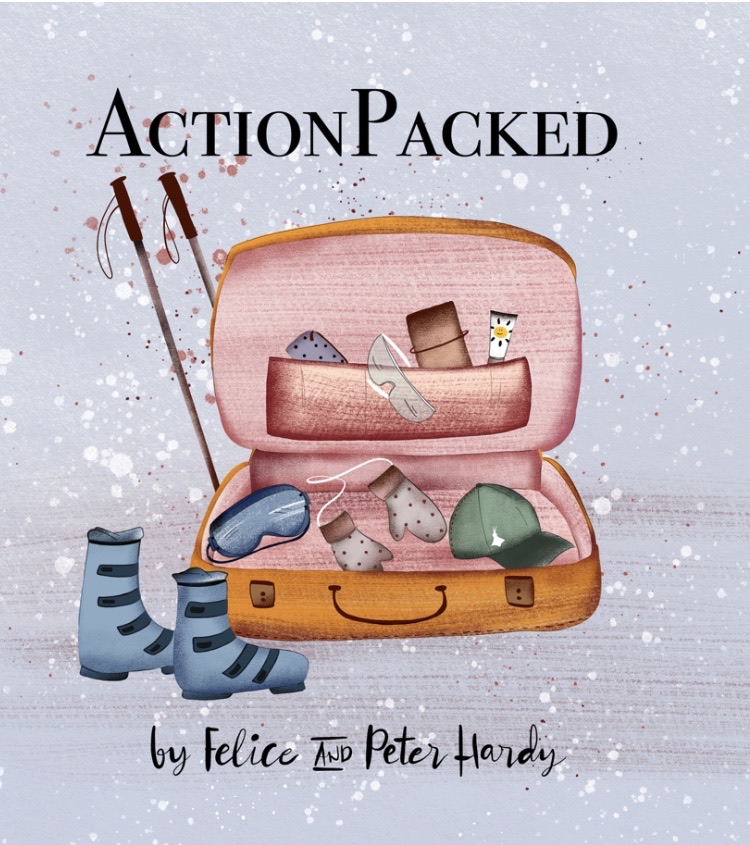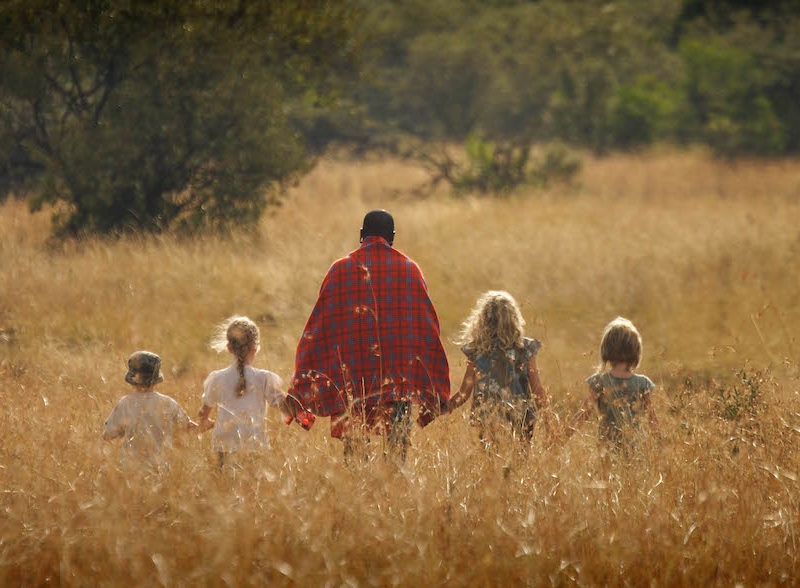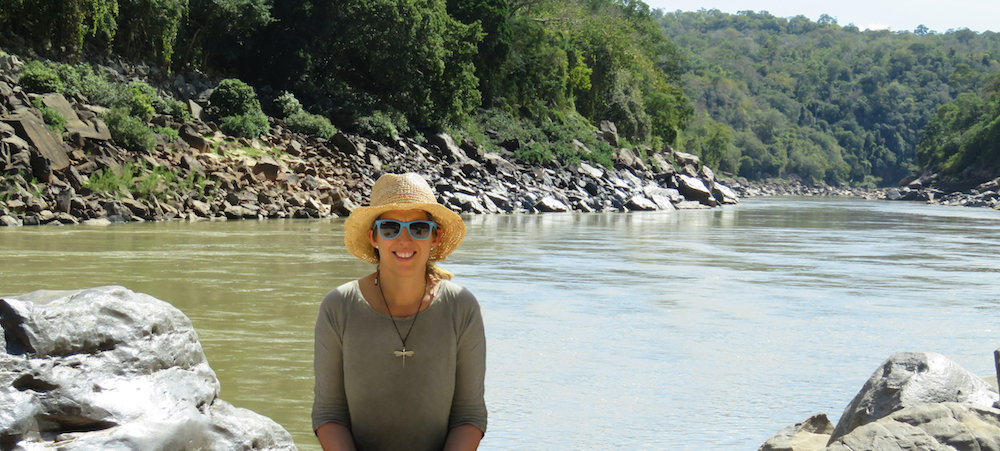
Aardvark Safaris started in 1999 and Alice Gully joined the company in 2004, which she now co-owns. Her interest in Africa began on a zoology degree at Newcastle University, where her entomology tutor inspired her with stories of exotic creatures that could only be found in Africa. Today she lives near Edinburgh with her husband and three young children, and is as passionate as ever about Africa.
Peter This week we’re on safari in Africa with Aardvark Safaris, talking to Alice Gully whose encyclopaedic 22-year-old knowledge of almost every luxury camp on the continent is invaluable to anyone wanting to see wild animals in their natural habitat. If you don’t know how to spell it, let alone know what an aardvark is, details of the company are here on our Show Notes.
So, Alice, welcome to our travel podcast. As your website tells us, you’ve ridden, driven, punted and drifted, you’ve floated and hiked, scrambled and flitted all over this wonderful continent in search of the best places, the best adventures, and the best people. So now, for you personally, where are the big three – the most exciting and rewarding safaris of all?
Alice It’s really hard to whittle it down. I think you want to be as wild as possible, you don’t want to go on safari to see lots of other people. So somewhere like Zambia – there’s a particular camp in Zambia that I love because you really are away from everybody. It’s called Luwi and it’s in the middle of South Luangwa National Park, probably one of the camps that is the furthest into the park. And it’s only open for a short time in the year because of the rains and they have black cotton soil there so it can’t open up during the rainy season, so it’s just to open from May to October. And that’s one place which I love.
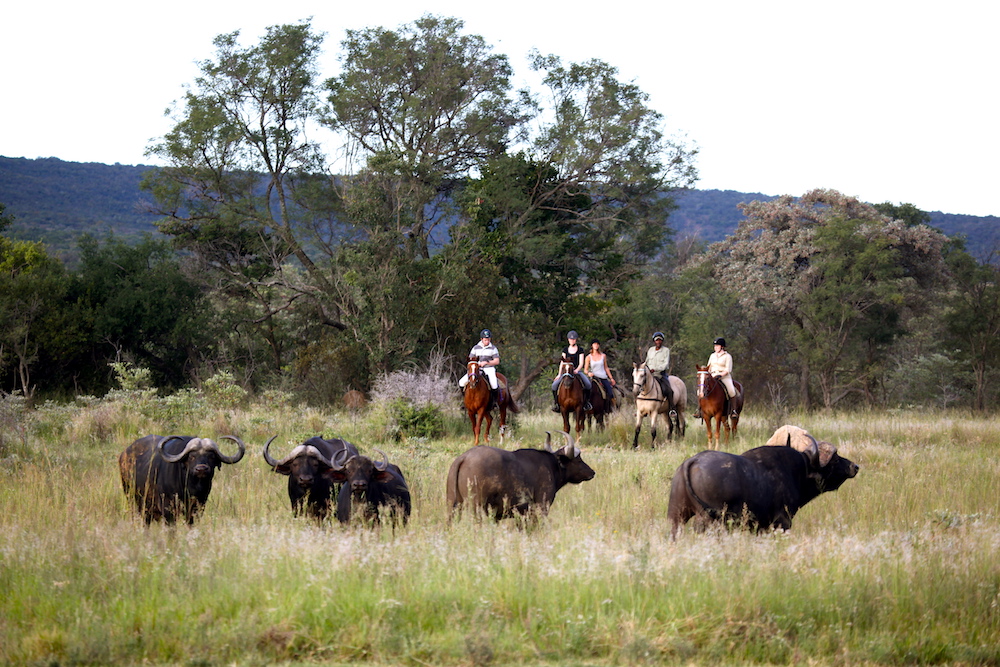
A riding safari probably would be the other type of safari, possibly because you can go off road, you can get away from people. But you also are riding part of the food chain, so the horses are very aware of where you are, what tracks you are crossing, any noises, any smells, and it adds another dimension to your safari without a doubt.
And probably my third choice of safari is to take my children with me. They ask the best questions, they open up opportunities with guides and people that we meet. We’ve been welcomed into homes that we would never be welcomed into without them. So I think they’re not specifically countries as such – but children definitely do a lot for a safari holiday, horses are quite exciting, and Zambia offers that remoteness that I enjoy.
Peter Now, while Felice has been on lots of safaris, I have to confess I’ve never been on a single one. In the course of my career as a newspaper correspondent, I’ve spent quite a lot of time in the bush with various armies and armed factions in different African countries. But when it comes to safaris, I’m a complete beginner, so I need to know exactly what happens.
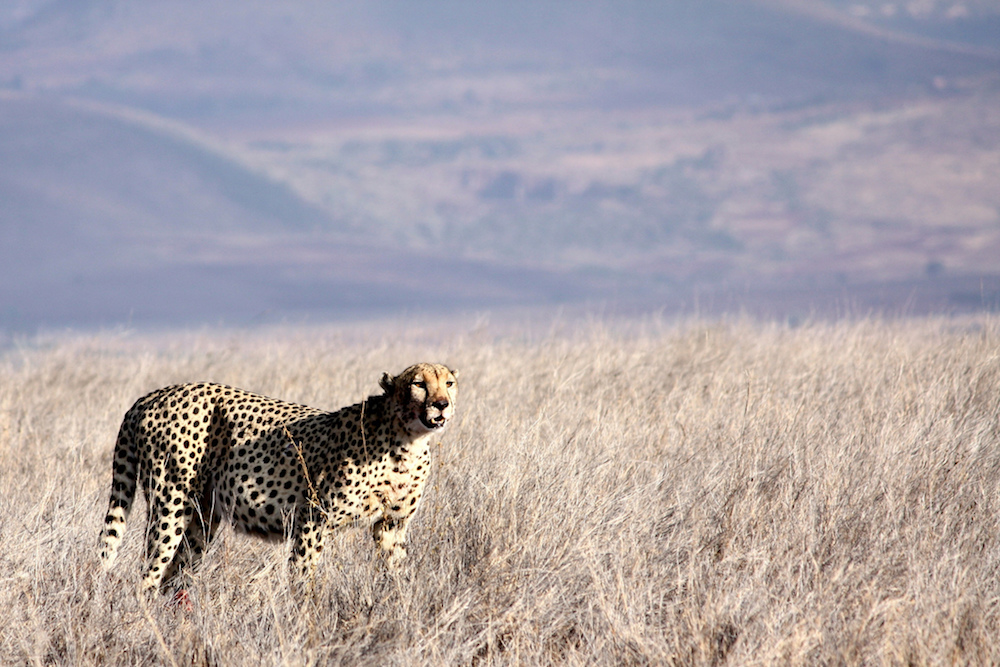
Lewa House cheetah. Photo: © Aardvark Safaris.
Alice I think it’s quite hard to give you an exact timetable, because what we do with our company is tailor each and every holiday. So depending on what sort of person you are, what sort of experience you want, we would then match you to a different safari to somebody else. So normally a safari holiday would have to tick your boxes first, and that might be to do with where you go, whether you’re walking or whether you’re riding or whether you’re on a Jeep safari. Most people their first safari want to see as much wildlife as possible. So we would probably pick slightly different parks in slightly different areas.
Then once somebody has been once or twice, they get to know what they want to see, what sort of style they enjoy, and we can get them a little bit more fine tuning. So on a first-time safari, we’d probably suggest somewhere where you could definitely go and see The Big Five – it’s a term that I don’t like because it’s associated with the old hunting days, but it’s the bigger animals, that sort of checklist. And then hope you get the best time of year so you don’t have a problem with insects or weather.
And then if you wanted to, if you’re a golfer or if you’re a walker, we’d incorporate a little bit of that so that people enjoy the activities that they do. And generally they start early in the morning so that activities are generally aimed around the activities of the animals. So if it’s a hot time of year they start earlier, there’s a longer lunch break, a siesta break, because animals don’t do much in the heat of the day. And then you would go out again in the afternoon and in the hotter times you go out later, in the cooler times you go out earlier. So generally speaking, safari fits into two activities a day. It’s not always about driving; it can be about different activities. And then you have a long siesta in the middle of the day, amazing food, very comfortable accommodation normally, and very jolly evenings as well.
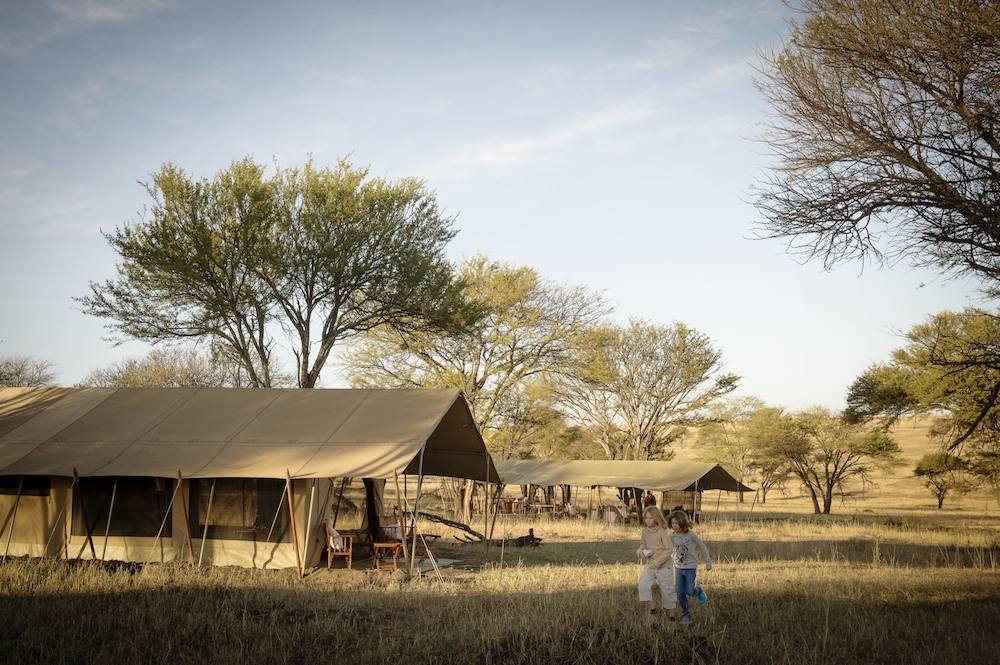
Serengeti Safari Camp. Photo: © Aardvark Safaris.
Felice What sort of accommodation can people stay in? Is it hotels or tents, or something else?
Alice Again, it would depend on what you want. It varies from camp bed and a roll-mat outside with no tents at all – and in certain areas you don’t need mosquito nets if you go at the right time of year – to dome tents where you’re very mobile and you move your camp every couple of days with a team of guides. So there’ll be tented camps which are rooms under canvas, which are quite big rooms, en suite bathrooms, flushing loos. And then lodges would be a permanent structure, a permanent home normally, with stone cottages and thatched roofs, that sort of idea, but you’re not open to the elements in any aspect. And then there are a few hotels – in safari areas we tend not to use them because they can take up to 200 people in one place. They use minibuses, which can be quite an impersonal way of going on a game drive. You can go to five-star hotels in the middle of the Masai Mara, it is possible, with all the extra mod cons that brings.
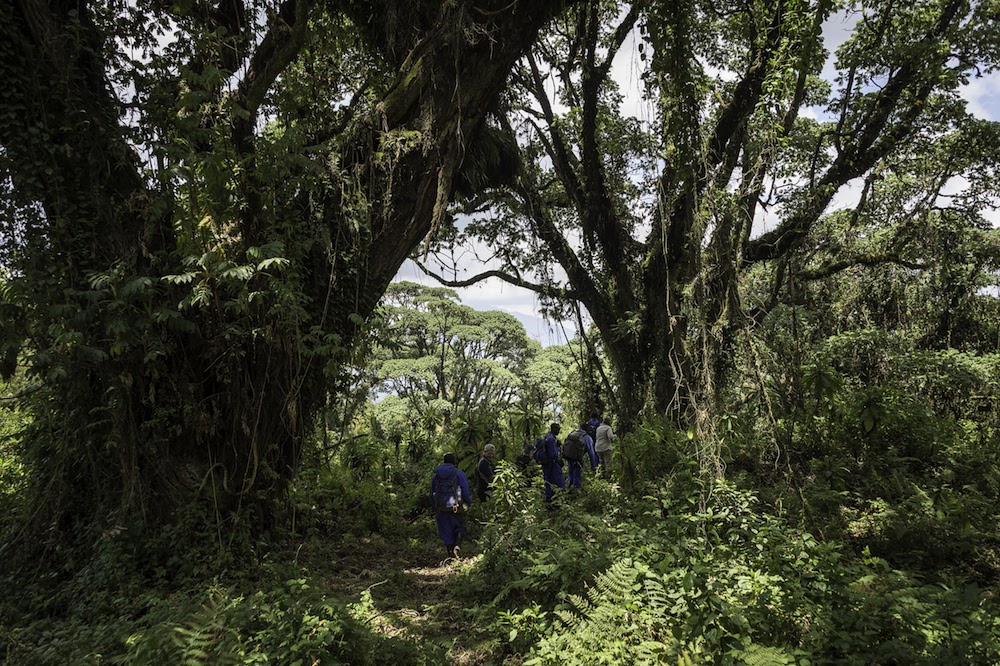
Walking in Rwanda. Photo: © Aardvark Safaris.
Felice Do safaris differ from one African country to another?
Alice Yes, they do. Namibia which is desert adapted would have a very different set up to somewhere like the Masai Mara in Kenya, where the wildlife is different, the way of going from A to B is different. So each country has got a different rainy season, different perks. So Zambia would be good for leopards for example, South Africa is very good for families because so much of it is malaria-free. Kenya’s got a very strong tie with the UK and a lot of people will enjoy going back to Kenya. Tanzania is a bit wilder. Malawi doesn’t have many full national parks teeming with wildlife like you would see in the Kruger or the Masai Mara, but it’s much more rewarding in terms of local people, the conservation work they’re doing, getting back to really understanding how the country works, and the people in the country. So they all vary slightly.
Peter What about the food? Do you get to eat what you see?
Alice That used to be the case. When I lived in Zimbabwe we tried to do a game meat meal once during someone’s stay. And I think you will probably find in certain countries you can’t do it, they don’t allow it. And in some countries working really ostrich like you can over here, I guess, and certain types of venison – it’s less popular than it used to be. So in South Africa you can definitely find kudu on the menu and that kind of thing, but less so in Kenya. But the food, we always get comments on how good the food is, and people can’t believe even on the very simplest of mobile safaris…and my children were baking bread in the ground with the Samburu, the last time we went to Kenya. They really can produce these incredible fresh meals, very Western meals, really from almost nothing, from a tiny little camp stove or a bread oven.
And, again, some people will give you a traditional evening, some traditional African food one evening and mix it up a bit. But it tends to be western food that people will be familiar with. And reliably people tell us how incredible the food is. And in fact, probably one of the complaints we get, I guess, would be the food and the fact that there’s so much of it and it’s so delicious. And I think some people have a bit of a conscience about that when they’re out in Africa and they’re rejecting puddings and cakes when there is a feeling that there’s a bit of waste, I guess.
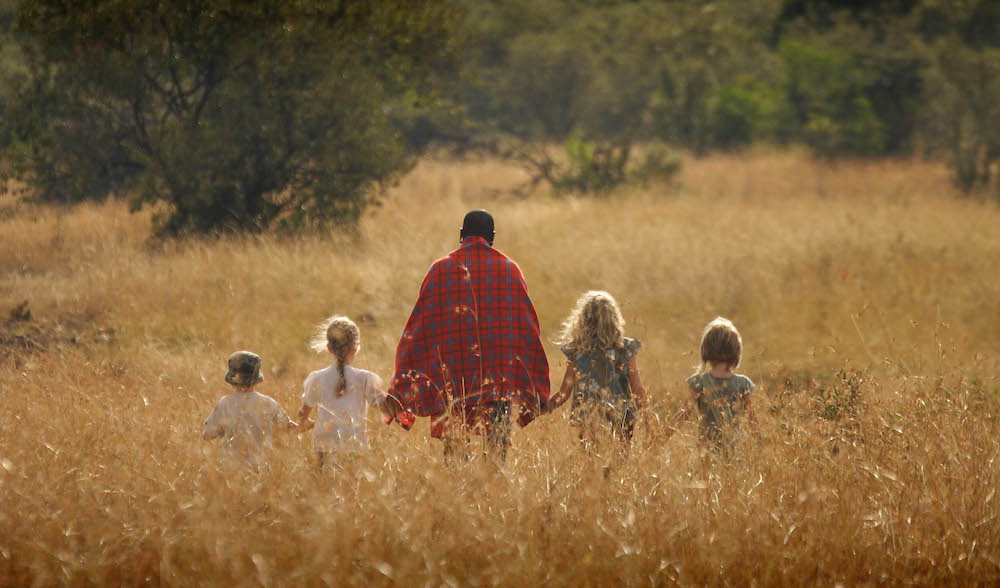
Walking. Photo: © Steve Mann.
Felice How do safaris help the local communities? Do many locals work with companies like yours?
Alice Yes, lots and lots. Actually this is quite a big focus for us at the moment with coronavirus. What we do as a company, we go out to Africa and we check out new camps and part of the criteria is that we not we’re not using international chain hotels. We are using locally-run and -operated camps and lodges throughout each country, not in every case, but the majority of cases. And then each one of those small camps, which we tend to use over or lodges over the big hotels, if you go in a ratio of 1:10 and they had 40 members of staff, each member of staff would probably support about 10 people in that immediate community. So it’s very important to have this engagement. If they’ve got three children, they have to pay for education in most African countries – so that supports the local school. You’ll find grandparents are supported by the lodge, parents, the local football team, the local medical clinic, the knock-on effects are huge for each and every camp. Even in these tiny, tiny camps, which only have six rooms there’s a huge local involvement.
And local guides, normally the best guides, have grown up in the local area, certainly they know the specifics about that country in so much detail. And sometimes in the Masai Mara, you’re dealing with Maasai guides who’ve grown up in the next little village and they can tell you where they first found a snake when they first saw an elephant on foot. It is literally their back garden. So, yes, it’s very important to engage locally.
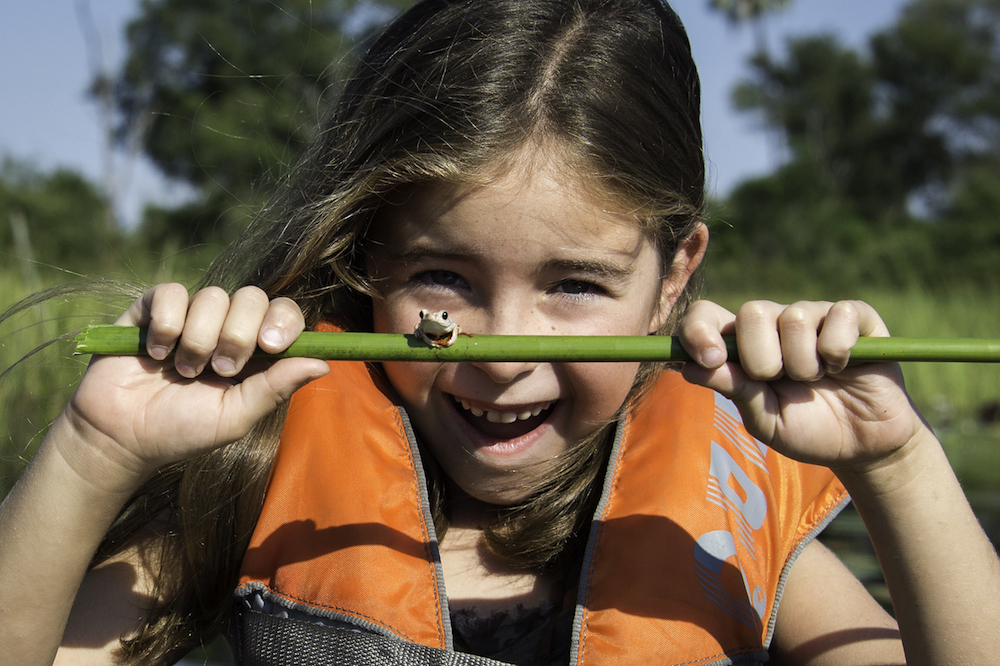
Seba Family Wildlife. Photo: © Dana Allen.
Peter And you take children on safari?
Alice So we’ve been doing this for 22 years, and I think about half of our sales team have got children and we all travel with our children. So we we put a lot of effort and checklist ticking about which camp is suitable for children and which ones are not only suitable for children, but look after them properly so that parents also have a break. Because everyone knows if your kids are happy on holiday you have a much better holiday.
Certain countries have says restrictions on game drives, or if children can join you at mealtimes, that kind of thing. So I wouldn’t go too young – and also for them to remember it and to get the most out of it, you really want them going when they can get involved in all the activities and not be needing lunchtime naps and that sort of thing. So I would say eight and upwards is perfect, but there are certainly good safaris that we can do for children who are five and six, and South Africa or Kenya tends to fit that slightly better than the other countries.
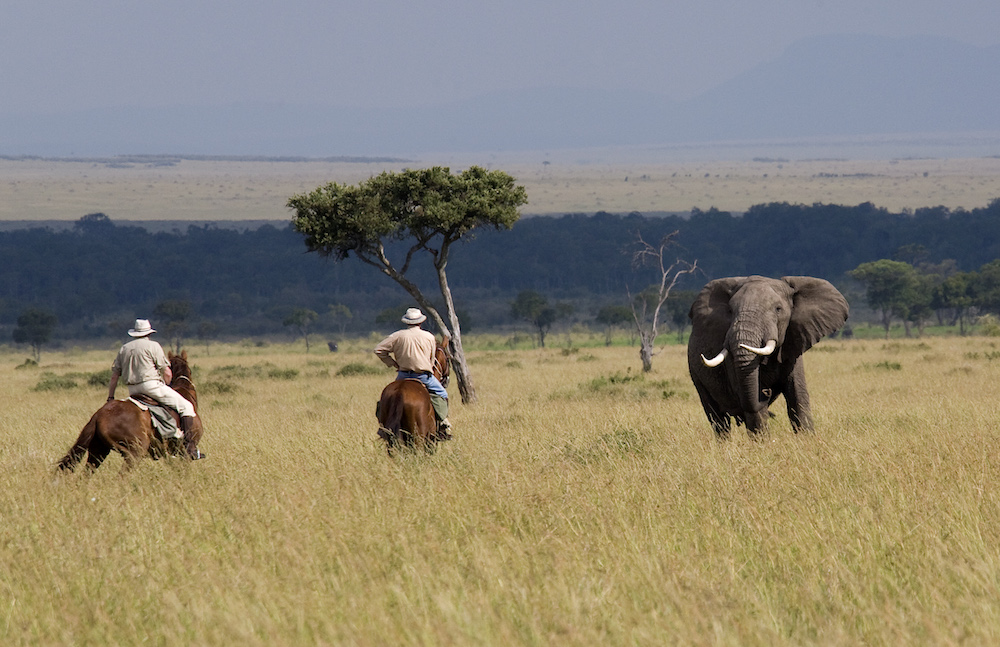
Riding from Kenya to Tanzania. Photo: © Aardvark Safaris.
Felice And what are the biggest dangers? Are some animals more dangerous than others when you’re on safari?
Alice I think ‘dangerous’ is difficult to answer. Animals are normally dangerous when they’re threatened or in an unusual situation. So if anybody has not listened to their guide, and has approached too close or has left their tent at night when they’ve heard something, then an animal could be dangerous because they don’t know what’s going on. We haven’t ever had a problem with an animal on safari because people are with very qualified guides and they do listen to what they’ve been told.
Humans are probably a danger to themselves. Hippos are probably the most dangerous animals in Africa in terms of what they can do. And obviously every animal, even a bushbuck…I’ve seen a bushbuck caught in a fence and it sadly had to be put down because they couldn’t get it out. and it was so threatening with its horns. So even a lovely bushbuck that looks like Bambi – but when it’s cornered and people are trying to help it, it can be very dangerous. I think it’s a difficult one to answer. Normally, accidents happen when people have done something foolish. And most animals have a way of warning you – like an elephant definitely has a way of warning people to back off. And again, if you canoed through a pod of hippos, you’d probably be asking for trouble. If you did anything without a guide and not knowing what you were doing, you’d probably be asking for trouble as well. We haven’t, touch wood, had any trouble from dangerous animals.
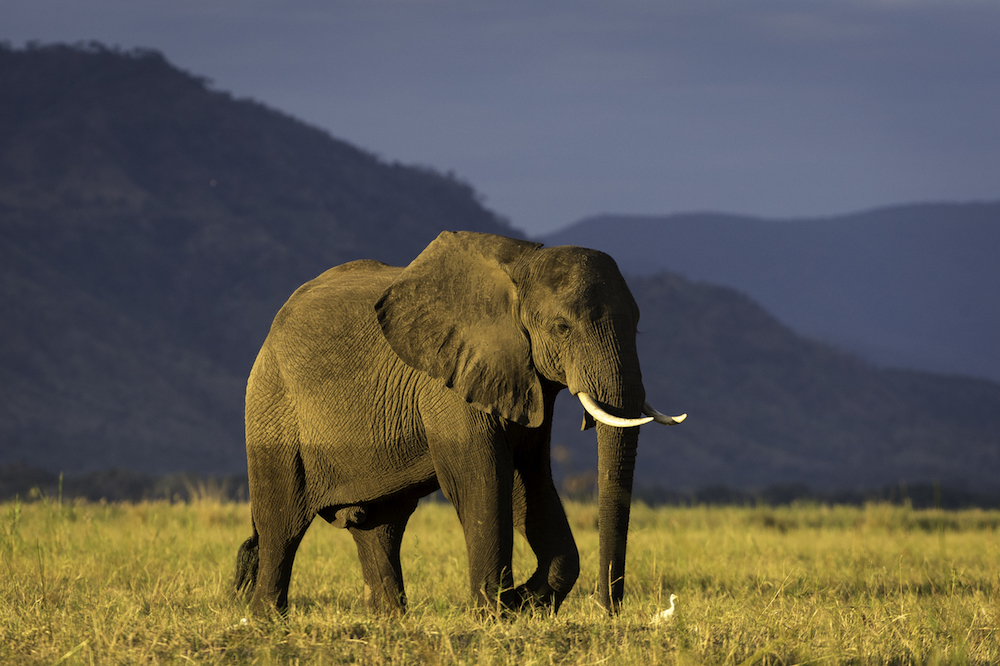
Ruckomechi elephant. Photo: © Aardvark Safaris.
Peter What about elephants, you mentioned there? Can elephants be dangerous?
Alice Yes, they’re probably the ones I’m very worried about. And there have been incidences over the time. They’re incredibly protective, they again will do anything to protect their young and their family connections. And that can quite often get themselves into trouble sadly. They are also partial to fruit and veg, so they can sometimes be on a bit of a mission to a lodge kitchen garden and destroy fences or property in the meantime.
I have been charged by an elephant in Tanzania and it is terrifying. And though she was protecting her baby and she did put a tusk into the vehicle, I didn’t think I was worried about them until a year or so later when I was next out there and then an elephant got too close to the car and I passed out. And so it’s become a sort of a bit of a phobia in the true sense of the word that I can’t actually control myself so I have to keep a distance with elephants. But they can be very intimidating, obviously. Very protective.
Felice You mentioned to me before that you once fell asleep and found an elephant was right next to you.
Alice That one was a long time ago, it was 22, 23 years ago before that situation in Tanzania. And I was working in Lake Kariba on an island called Chete Island, which is on the Zambian side of Lake Kariba. And there were two of us walking one day. We were looking for a family of seven elephants who lived on the islands and we were recording markings. And we stopped, we hadn’t found the elephants, we stopped and we rested against two trees facing each other. I was woken up by a guide telling me not to move a muscle and not to go anywhere. And I looked down and this trunk was coming from behind the tree and was sniffing all the way along my legs and my body, it went all the way around my head and back down again. And then very quietly, no one, neither of us moved, it carried on and just left us alone. And the guide said, because we were in its space, he came into our space and just checked us out, didn’t think we were threat, and just carried on walking. But if that had happened after we’ve been charged I might not have been quite so relaxed.
Felice What about being chased by buffaloes? I think you said you were once chased by buffalo?
Alice In terms of a scary experience, most things that have happened in Africa you’re normally…and even when we chat to clients, they come back with these amazing experiences – they aren’t scary because they’re sort of managed. And really the time I did get scared, knowing that I was scared at the time, was when we were pushing the boundaries too far.
I lived in Zimbabwe and was working on a riding safari. We decided we’d try full moon rides as a sort of trial with a couple of the local guides and we went with another professional guide. And I decided to take a horse called Delancey, who was gelded very late so still had stallion tendencies, which was my first mistake. We then went down to a water hole to see if anything was drinking at the time under the full moon.
There was a huge herd of buffalo there and we got into some thorns, which have got horrific hooks that go either side and catch you or anything passing. My horse missed the herd of buffalo without meaning to, and they were suddenly spooked and charged. My horse set off, sort of dropped his back legs to get through a bush, and I did stay with him but I lost my T-shirt, it was ripped off, and my arms were really bleeding. And again, the buffaloes weren’t chasing us in particular, they were trying to reunite the herd, but we got stuck in the middle of it. But that was the end of the full moon riding idea.
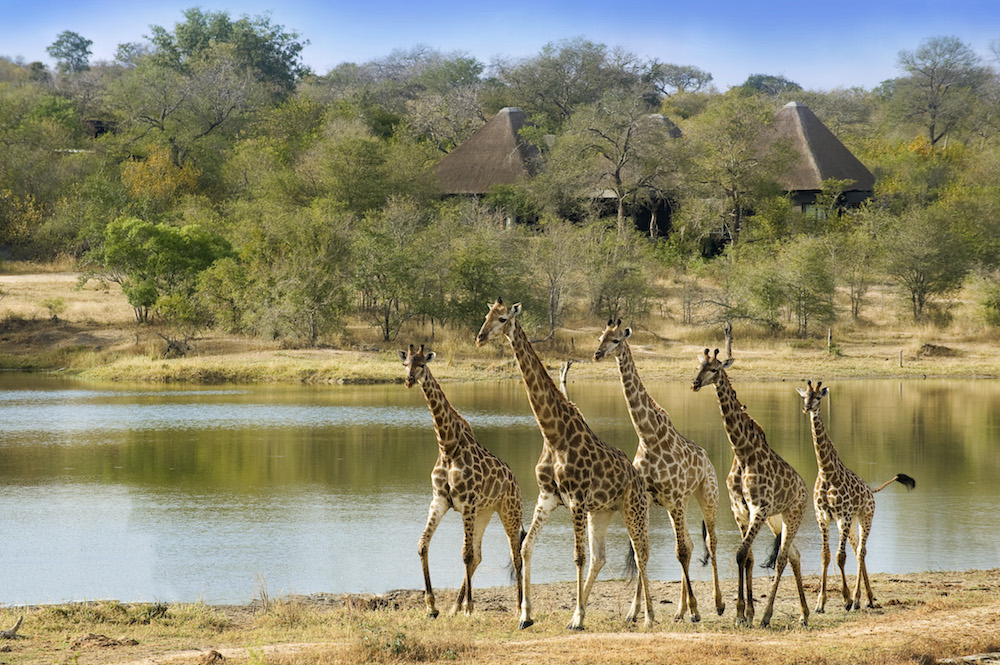
Chitwa Chitwa giraffe. Photo: © Aardvark Safaris
Felice To go on a safari on a horse, do you have to be a very experienced rider?
Alice No, you don’t have to be. There’s a number of rides that you can do and they’re very much split between advanced, intermediate, and beginner. So my children have ridden in South Africa on a reserve called Ant’s Nest, which is this most incredible place for families. But they have got very chilled-out ponies, they don’t have elephants, they don’t have lion, and they’ve got very habituated, not tame, but habituated rhinos. And you can ride there. My husband’s ridden there and he really is anti-horse. That you can potter around, walk and trot, getting close to sables, zebra, giraffe – and it’s very safe. If you want to ride with the migration in Kenya or in the Okavango Delta in Botswana, you have to be a capable rider just for the safety of the group.
Peter What about snakes? During my time in East Africa, I encountered quite a few and – foolish though it may be – but I have to confess that I’m not that happy to be around them.
Alice If you wanted to see a snake, you would go during the rains and when it was slightly warmer. To find snakes in the dry season when it is cooler for them is quite difficult. We have very few people who come back with snake stories. Occasionally pythons are seen quite a lot. Unless people go to somewhere like the Kalahari during the rains when you’re definitely increasing your chances of seeing them. So they’re not common; normally they hear you long before you see them so they scuttle off. Most of them don’t hang around. I didn’t know how common or how rare they are – I’d say something like 20% to 30% of people would see a snake on a safari, but it’s very unusual.
We had one instance I was working in Zimbabwe where we had a snake – a spitting cobra – in the kitchen. The chef got quite upset about it because there’s a link with witchdoctors that it’s related to adultery and that it’s a punishment for adultery. And I wasn’t aware of this, and he then went home and found another spitting cobra under his bed, which he took as a second warning about adultery – somebody in his family, or his wife. And then I think the cobra ended up biting him or he was bitten through a plimsoll, that it caught the rubber of his plimsole and at that point, he said he wasn’t coming to work until he established what was going on.
Peter Sounds like he definitely needed to sort out his marriage at this stage.
Felice You mentioned that some lodges are now using hides for better photo opportunities?
Alice Time goes on looking for fresh ideas, keeping people engaged, and offering something new, everyone wants to offer something new. A big thing in the last three to five years probably are these photography hides. Anyone wants to try and get a slightly different angle or a closer shot to something like the carmine bee eater, which are beautiful in Zambia. They set up a number of lodges, have now these hides. One quite clever idea is to get a shipping container and to sink it into the ground next to a waterhole and your camera lens is eye-height to the level of the water.
There are some pretty good photos that you can get of elephants with their trunks drinking right next to where you’re sitting – and those hides are in place all the time so the elephants don’t know whether they’ve got people in them or not. There’s another one for lion and leopard in the Luangwa Valley as well. So you can just get into these hides and they’re quite a peaceful way of safari. If you go into a hide over a lunch break or siesta and you can just look up every so often if you’re reading a book in a siesta, and just be in the hide everything in front of you so you can take the right face a but just wait for things to come to you rather than you chasing things around by car. It’s quite a nice way of doing things.
Peter Poaching, rhino in particular is never far from the headlines. Is that a problem?
Alice Yes, it is a problem. A couple of species are definitely in trouble. We do a lot of work with the lodges and guides and fundraisers on this. It’s an education problem – sometimes preaching to the west doesn’t really help because that’s not where most of the funds are raised. There are a number of very good safari operators and private landowners who are protecting them. Rhino poaching is shocking. A poacher can get in and out of a situation very quickly with a rhino horn – often quicker than anyone else can pick them up. But at the moment with the corona lockdown and travel bans, I haven’t got any data updated, but I know they’re worried about subsistence poaching for local guys sustaining their…taking food home, basically. I wondered if there might be a drop in some bigger commercial poaching because it would be harder to get ivory tusks and horn out of the country, but that’s not confirmed. I just wondered if the movement of those things would be difficult at the moment.
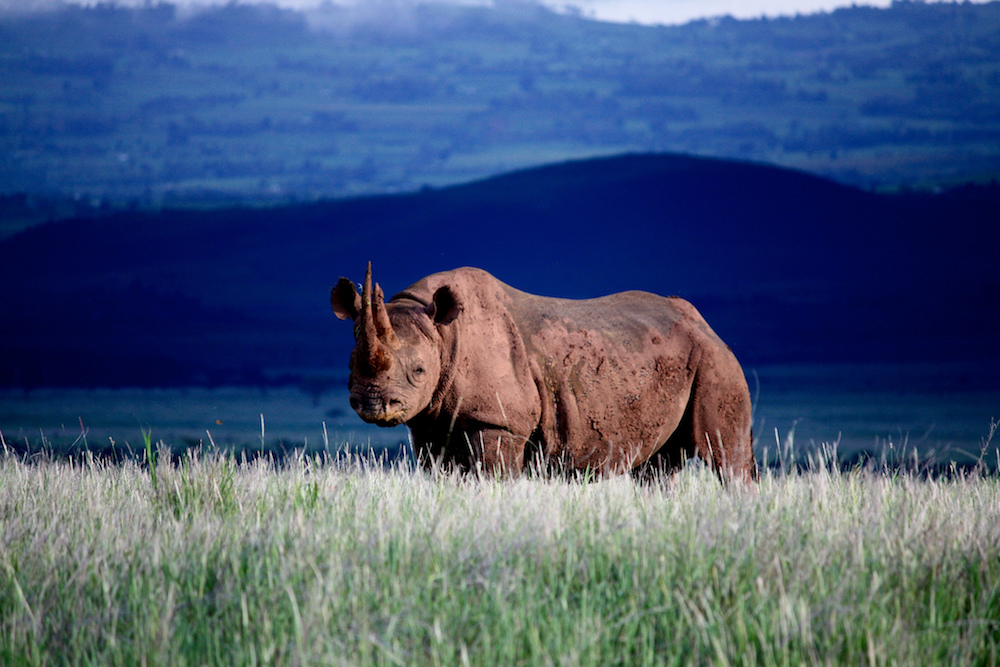
Lewa House rhino. Photo: © Aardvark Safaris.
But rhinos are increasing in certain countries. There are definitely some safe havens. They are still at risk. But it’s an education for the Vietnam, China, those areas where some children that we spoke to didn’t even know that rhino horn came from an animal, they thought it was a sort of substance that you could dig out of the ground. It’s just there’s so little education on the ground and that’s where it’s really got to change, and whether there’s enough time to do that is another question.
Felice How about the local staff at the moment? Presumably they don’t have any work?
Alice Yes, we’ve spoken to a number of lodges about this, and yes, a lot of them have reduced hours. So some of them have laid off some staff, others have taken 30% pay for the next couple of months for as long as they can so they’re engaged in tourism and employed in tourism. Some people have…one guy I spoke to in Botswana, he very rightly pointed out if he lays his staff off, he can expect to drop in wildlife in the immediate area around his camp because if those guys need food, the first place they’re going to go to for a snare is on their doorstep, which they know which will be his camp. So he’s wanting to keep people engaged as much as he can.
Some other camps are changing the roles of the staff, so they’ve been taken off housekeeping and put onto anti poaching, so they join anti-poaching patrols. And other guides in camps have set up virtual game drives. And we’ve been encouraging everyone to log in and watch some of these game drives because having these guides out and about filming it means that poachers can hear vehicles. They’re still going out there still and they know they’ve got a following behind them, and that’s encouraging these guys as well to stay engaged in tourism.
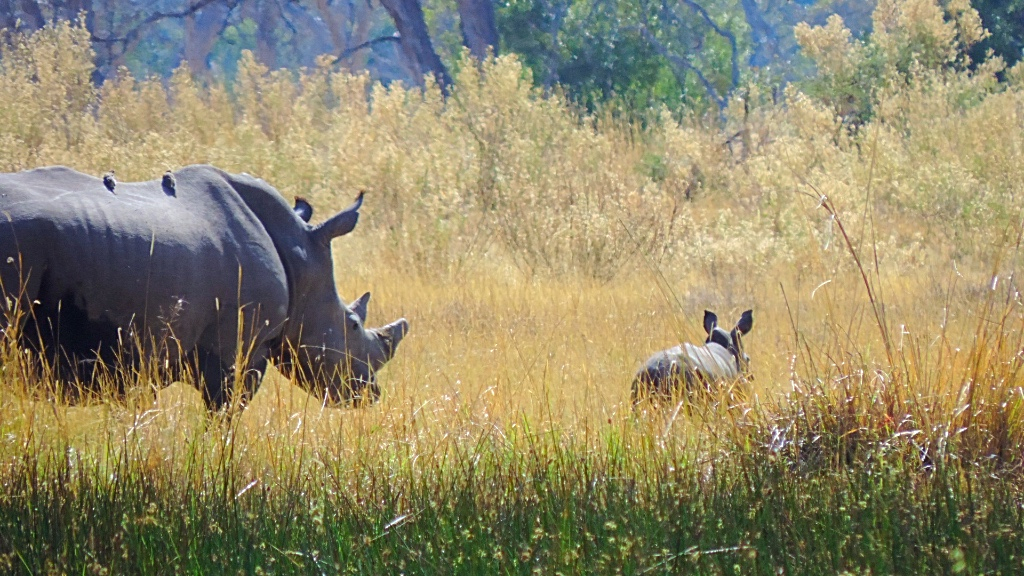
Baby rhino. Photo: © Aardvark Safaris.
Felice How do you see a virtual game drive? Is it on your website?
Alice Facebook’s got most of them. But we’ve got a few details on our Instagram and Facebook page. But a lot of the safari lodges as well – and we’ve been sharing quite a few of them – but a lot of the safari lodges have also been posting them on a daily basis. So there are a lot out there. And they’re normally an hour or two long, but you can watch in the corner of your screen if you want; you can go on a virtual safari.
Peter What about mosquitoes and other insects?
Alice Yes, they’re definitely a sort of entomologist’s dream in Africa, but they again tend to be a wet season problem. Obviously not all of Africa is malarial, some bits are malaria-free or low-risk malaria. Yes, as soon as the rains come, there is literally an outburst of insects. And the other place which we went to in the dry season was Brazzaville, Congo. And my husband, he’s been on lots of safaris, said that trip there were just too many insects for him. And I do warn people now, if they go to see the lowland gorillas in Congo, they have to be prepared for crunching bathrooms because there’s a lot of insects there.
Felice Tell me about safari ants. They can be pretty dangerous, can’t they? I think your husband once had a bad experience with them. What happened?
Alice So we were walking in the Kafue National Park near a camp called Busanga, and Jim suddenly started really slapping himself all the way down his legs. And the guide said: ‘You’re being bitten by a load of ants at the same time.’ So we had to quickly pull his pants down and his shorts down and get all these ants off his legs. But they’ve got these incredibly strong jaws that go through the skin. So when you’re pulling these ants off, you’re also pulling them out of the skin. And their jaws are so strong that the Maasai use them as sutures to heal cuts. So they have their uses as well. But when you’re bitten by a few of them at the same time it is incredibly painful, as Jim found out on a walking safari. If you stand still for too long in their path, they will go up your legs.
Jim’s first night in Africa, which was actually on the same trip as the safari ants story, I said to him: ‘You’ll definitely hear things through the night. There will be bush babies on top of the tent. But just don’t worry about it. It won’t be anything. And he woke up early and said: ‘There is a pride of lions outside our room and they’ve been making a huge noise all night.’ And I was suitably patronising and told him it was probably just a bush baby and of course it wasn’t lions as that’s so unusual to happen this close Anyway, we got ready to go to breakfast and sure enough there was a pride of lions about 30 metres away eating what they’d killed through the night just outside our room, so we couldn’t go to breakfast and had to wait to be saved. So that was his first night on safari.
Felice What’s a typical guest like?
Alice We do have a huge variety of people, quite a variety, although safari sounds like a one type of quality. There is a enormous diversity. I would say a typical guest is somebody who wants to engage with their local environment and that can come in any form. But if you want to lie flat and get a suntan and not know where you are, Africa’s probably not for you. But for the majority of people…you learn a lot on safari, it is a very interesting holiday.
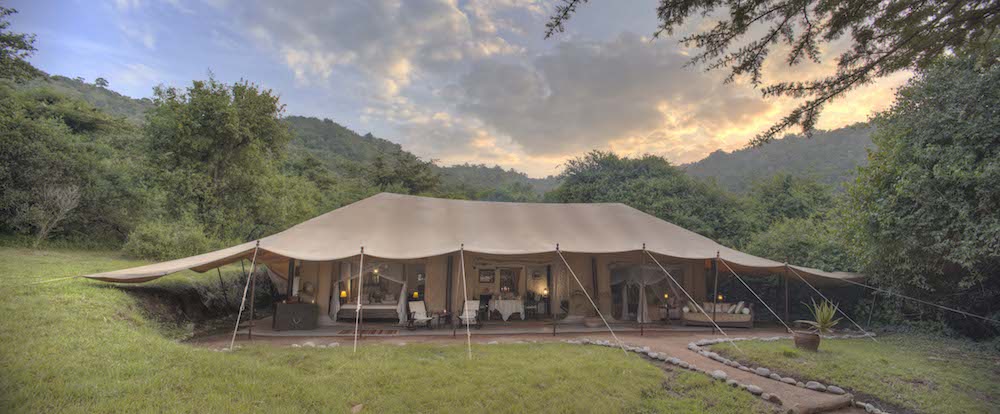
Cottars Safari Camp, Kenya. Photo: © Aardvark Safaris.
Because we only do South Africa and the Indian Ocean, we also have a very educated database and very loyal client following. We haven’t had many cancellations; most people still want to travel. And so most people – probably something like 90% of them during this particular incident – have postponed their travels til next year. In that way we haven’t had many people just wanting to pull out – they understand, they’ve gone through Ebola with us in 2008. They understand that things come back and they still want to go. So, yes, we are fortunate that we’ve got an understanding clientele.
Peter So what should someone pack to go on safari? I mean, you need to see some special clothes? What kind of footwear?
Alice So we do have a very snappy interactive online packing list, which we brought out last year, because again, depending on where you’re going during the rains, depending whether they’re going to Namibia, Madagascar, all these countries have slightly different requirements. But generally speaking you want to have mute colours, nothing bright that is going to stand out, especially if you’re walking or getting out of the vehicle you want – not blend in safari colours but just no bright blues or pink. So I recommend sturdy footwear, I recommend that you wear closed shoes on safari.
The other thing I’d say as well is that people tend to go during the dry season for obvious reasons, but that is also Africa’s winter – the winter can get a lot cooler than people think. So we always tell people, just to warn them, especially in June, July in southern Africa. We always encourage people to take hat, gloves and a fleece for those early mornings are often cooler than you think. And there are hot water bottles in your beds at night.
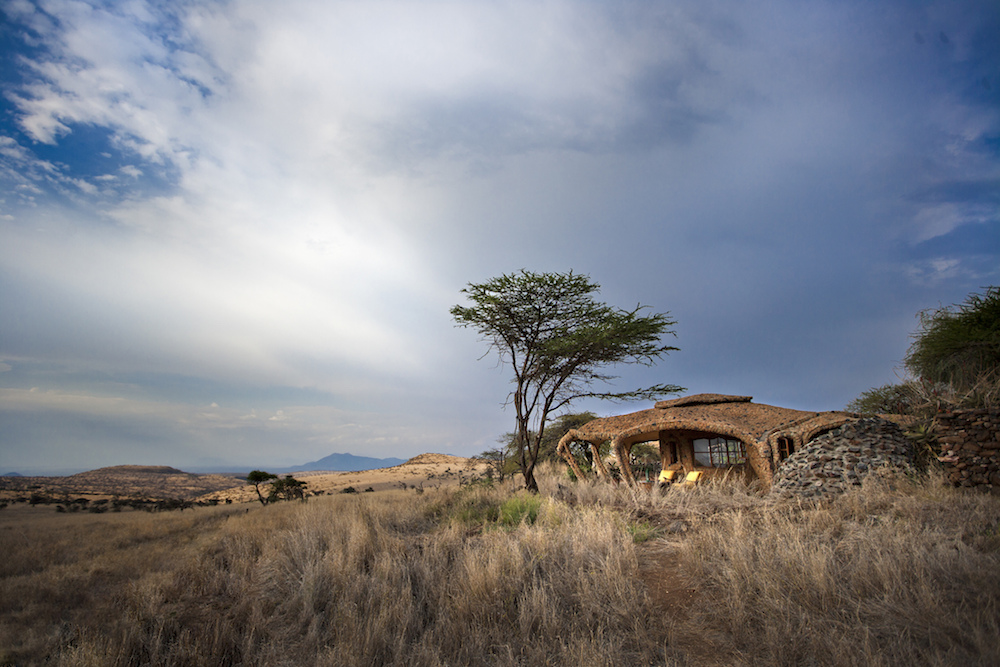
Lewa House accommodation. Photo: © Aardvark Safaris.
Peter Are there particular specialist types of safari? What if people want to see leopards, for example.
Alice Yes, we do get requests from people who want to see a specific species on safari. There are ways of maximising their chances. I’d say Mother Nature always has the final word so it’s very hard to give any guarantees. If people want to see leopard, normally there’s a number of places you can go. But the South Laungwa in Zambia is very good. And there is a camp in South Luangwa who have had, I think, a three-year success rate of leopard sightings just from their location and the food source that surrounds the camp. And we were there and Jim, my husband, was sitting in the bath – they’ve got an outside bathroom on the banks of the river – and one walked past the bath.
Peter Do you think that safaris are going to survive successfully when travel fully returns in the post-viral world that hopefully we will have one day? Clearly, we’re going to have a deep recession and of course, safaris are an expensive type of holiday.
Alice I think they will recover when the bounce-back happens because of the nature of the safari, especially the safaris that we do. Social distancing is almost the norm, you’re not hanging out with lots of people. I know you have to fly out there on an aeroplane, but once you get there, you are away from city, away from the big hotels. So I think the safari industry will recover, but the recession will affect everybody. We didn’t do too badly in the last recession. This level of safari seems to cope quite well. But we are just going to have to do what we can and help people as much as we can when we get out the other side and the travel ban’s lifted. But I think the safari industry will survive, if on a little skinnier version.
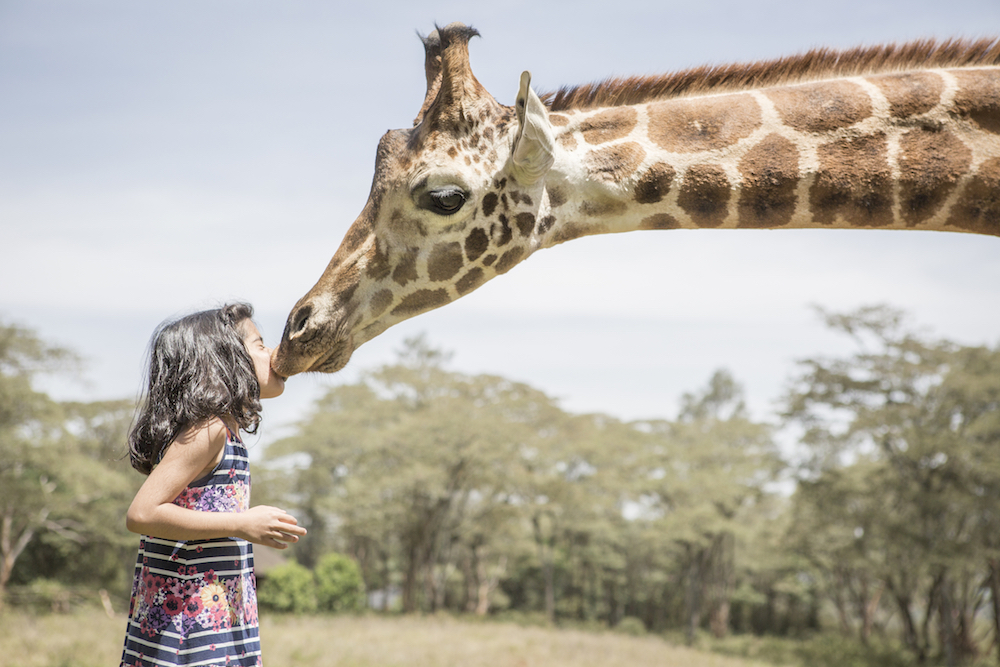
The kiss, Giraffe Manor, Nairobi. Photo: © Aardvark Safaris.
Peter Alice Gully, thank you very much for appearing on the show. We wish you the very best of luck in the future with Aardvark Safaris. By the way, that’s A A R D…and Google should do the rest for you.
Alice Peter and Felice, thank you for having me on the show.
Felice That’s all for now. If you’ve enjoyed the show, please share this episode with at least one other person! Do also subscribe on Spotify, i-Tunes, Stitcher, or any of the many podcast providers – where you can give us a rating. You can also find us on Twitter, Facebook and Instagram. Stay safe and we’ll see you next week.
© ActionPacked Travel
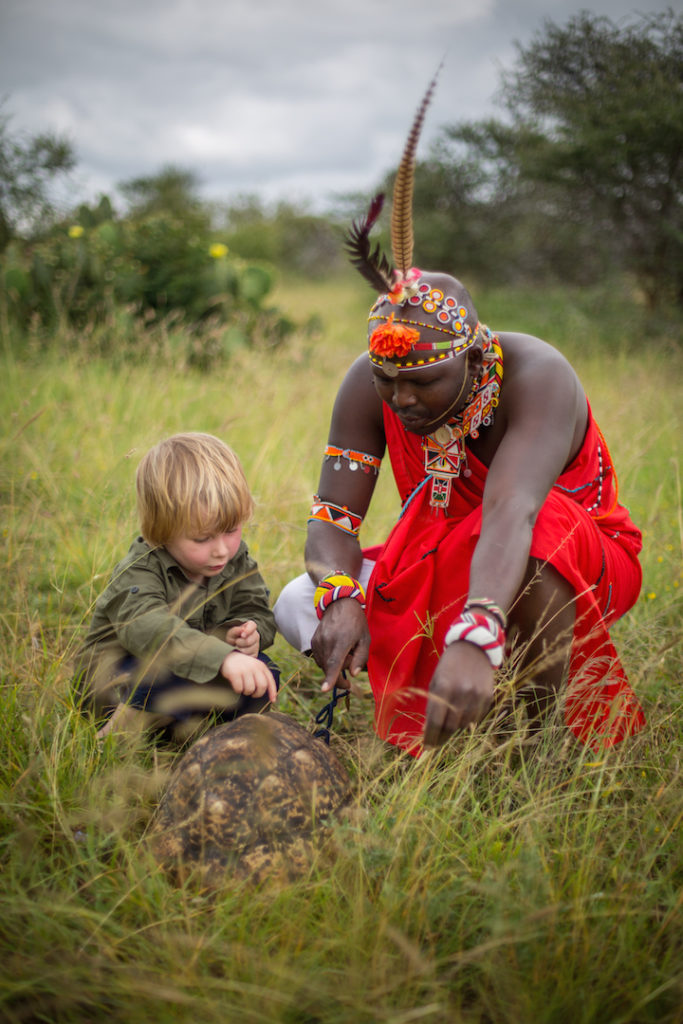
Elewana Loisaba Tented Camp. Photo: © Silverless.
Aardvark Safaris only operates in Africa and the Indian Ocean. They have worked with the majority of their suppliers for many years and visit them regularly. Where possible, they select small, owner-run camps and lodges so you can experience the bush away from the crowds. They use camps that employ the most experienced, personable guides, with unrivalled local knowledge. Aardvark does everything from planning your itinerary to giving advice on what to pack.
Also see Saving Elephants And Climbing Everest With Holly Budge.
© Action Packed Travel

- Join over a hundred thousand podcasters already using Buzzsprout to get their message out to the world.
- Following the link lets Buzzsprout know we sent you, gets you a $20 Amazon gift card if you sign up for a paid plan, and helps support our show.
